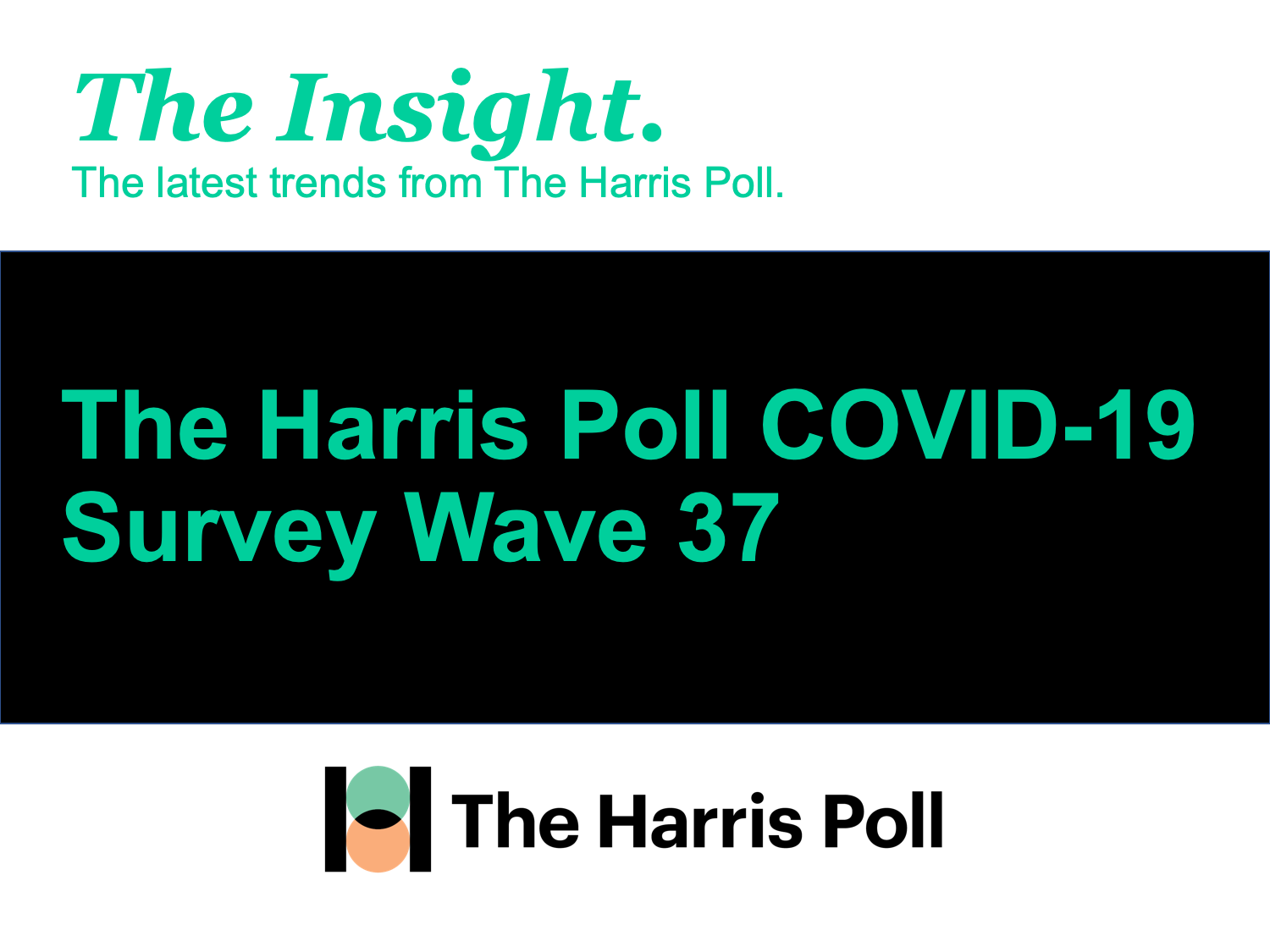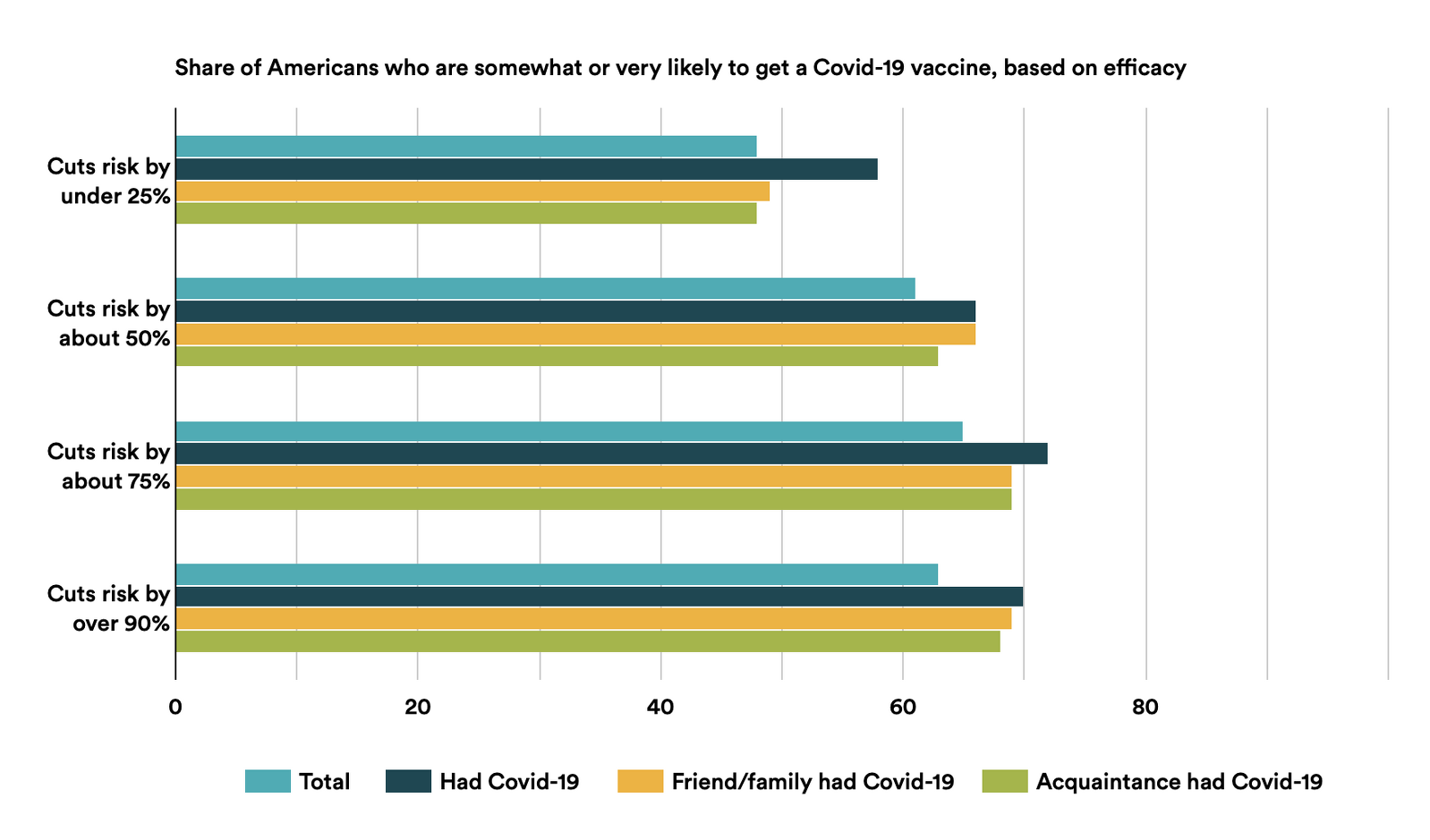Brief • 4 min Read

We draw your attention away from the Electoral College to put this contest into the context of our nation’s emotions and outlook. In The Harris Poll COVID-19 Tracker (Week 37) fielded November 5th – 7th, 2020, we continue to take the pulse on Americans’ expectations for a vaccine, what Thanksgiving during a pandemic will look like, how Americans are coping with COVID-19 stress, the bipartisanship of tech antitrust, and get a pulse on the 2024 presidential race.
As a public service, our team has curated key insights to help leaders navigate COVID-19. Full survey results, tables, and weekly summaries can be accessed for free at The Harris Poll COVID-19 Portal. We will continue to actively field on a regular cadence to track the shifts in sentiment and behaviors as the news and guidelines evolve.
STAT-Harris Poll: Most Americans won’t get a Covid-19 vaccine unless it cuts risk by half
A new survey from STAT and The Harris Poll found that six in ten Americans are somewhat or very likely to get a Covid-19 vaccine if doing so would lower the risk of becoming infected by about half. Here’s what else the survey found:

- Younger generations are more risk averse: only (56%) of those between 18 and 34 years old are likely to get vaccinated if a shot would decrease the odds of becoming infected by half. This rose to (64%) though, when a vaccine would reduce the risk of contracting the coronavirus by 75%.
- Familiarity with COVID19 increases likelihood: More Americans say they are likely to get a vaccine, practice social distancing, and wear a mask if they or someone they know has contracted Covid-19.
- “As people are hearing stories about friends and family or from an acquaintance, it’s shaping their views,” said Jekielek. “So being able to show people the implications on someone’s health is really important.”
- The survey results came in just before Pfizer announced that its vaccine candidate was effective in over 90% of uninfected clinical trial patients. Pfizer’s chief executive has said that it could have 30 to 40 million doses of the vaccine before the end of the year, enough for 15 to 20 million people to get an initial shot and a booster three weeks later.
Takeaway: News of the vaccine is promising but we still have a long road ahead. While the world waits for a vaccine that meets their standards, people continue to fight the daily battle of desire over safety; the only defense we have are masks and social distancing, but still today only (54%) said they were less likely to attend a large group event after contracting Covid-19…
Ready or Not, It’s Almost Thanksgiving 2020
In a year where time seems to be standing still, we are just a few weeks away from Thanksgiving. While our latest data, covered exclusively in Adweek, shows (75%) of Americans have plans for Thanksgiving this year, like almost every major event in 2020, this holiday is going to be different.
- Celebrating Thanksgiving Bubble Style: With COVID19 cases spiking across the nation, many Americans are opting to celebrate in smaller groups over traditional large gatherings; nearly 4 in 10 (37%) will be celebrating at home with their immediate family while less than a fifth will be celebrating with extended family (16%).
- Read more: The CDC just released Thanksgiving guidelines focusing on small household gatherings
- Nearly a third (31%) of Americans say political conversations in their family are more heated this year compared to last year and (32%) are anxious thinking about their family’s political debates over Thanksgiving, especially Gen Z/Millennials (44%).
- Keeping the peace at the Thanksgiving table: Around half (51%) of Americans say they avoid discussing politics with their extended family at all costs during the holidays.
- Stressed? Butterball Turkey Hotline has your back: Butterball’s Turkey Hotline has been preventing Thanksgiving disasters for 35 years and has evolved with the times; this year they are ready to address whatever issues callers might have—whether those are related to thawing time, oven temperature or higher stress levels because of everything happening in the world right now.
Takeaway: While Americans are anxious heading into Thanksgiving this year, the thirst for connection is at an all time high: (71%) miss gathering with friends and family, and more feel thankful (65%) than those who feel angry (48%). Businesses and marketers should take note from Butterball’s Turkey Hotline, because (76%) of consumers say they will remember the brands who did the right thing by addressing issues related to the COVID-19 pandemic.
Mental Health Check In
During the pandemic, Americans are experiencing a mix of emotions: in our annual Stress In America study on behalf of the American Psychological Association, nearly 8 in 10 adults (78%) say the coronavirus pandemic is a significant source of stress in their lives. What’s more is that (62%) think the worst of COVID-19 is still ahead of us and (48%) are upset that they don’t know when this will end. We checked in with Americans on how they’re coping with the stress and anxiety that comes with the pandemic:
- Tuning out: While (46%) have cabin fever and (34%) feel overwhelmed, (59%) are coping by watching TV, (43%) are listening to music, (33%) are playing video games, and another (33%) are streaming TV shows and movies.
- Fostering moments of connection: Meanwhile, (43%) feel lonely and just over one-third (36%) are spending time with their family to cope with pandemic stress.
- Reflection and Gratitude: Meanwhile American’s are ushering a counter response to stress and dislocation through reappraisal of their values and lives to focus on the things that really matter; more people feel appreciative (67%) than those who feel angry (48%).
- Adopting new habits centered around betterment: we see people have a renewed appreciation for the outdoors (69%) and are getting out walking more to enjoy it (40%). Looking ahead, (42%) plan to stay more physically active; (76%) of people who have donated to charity due to the pandemic will continue to support in the future; and nearly one-third (31%) changed their industry or career path.
- How businesses are stepping up: Tech company, UiPath expanded its mental health benefits to employees, committing the equivalent of 1% of salaries to health and wellness programs, as reported by CNBC. Hims, launched Anonymous Online Support Groups for everyone, offering free sessions focusing on everything from relationship issues, anxiety, and insomnia.
Takeaway: Serve the betterment consumers seek. If a sixth grader reinvented a classic video game to combat the stress of COVID-19, so can businesses.
The Bipartisanship of Tech Antitrust
Once the Biden Administration takes office in January, Americans can expect a drastic pivot on any number of big issues. However, there is one contentious issue that we may see continuation in some form: antitrust against big tech.
- Why is this one issue in which the two administrations are not on opposite sides? In our poll from late October featured in Axios, we found Americans overwhelmingly see the big tech companies as having monopoly power that limits competition and it cuts across partisan lines: (77%) of Republicans and (76%) of Democrats agree the “Big 4” tech companies (Amazon, Apple, Facebook, Google) have a monopoly in their respective sectors that limits competition and innovation.
- The New York Times writes how the future Biden Administration “is expected to keep scrutiny of tech front and center. […] Bipartisan support to restrain its power has grown sharply during the Trump administration, and shows no signs of going away as Democrats regain control of the White House. Mr. Biden is expected to take on the Silicon Valley giants on misinformation, privacy and antitrust, in a sharp departure from the policies pursued while he was vice president under Mr. Obama.”
- Search engine cognitive dissonance: while 8 in 10 (80%) Americans say adequate alternatives to Google’s search engine exist, the same number (80%) say Google is their first choice when searching for information online (followed by Bing at 6%) and half (50%) also say Google has too much control over the online search engine market and their options as a consumer are limited.
- More than half (55%) of Americans agree that Google has too much power and should be broken up; while (45%) say the same of Facebook and (37%) of Amazon.
Takeaway: Americans of both parties have a love/hate relationship with big tech that does not appear to be ending anytime soon. We wrote last year about the Tyranny of Convenience many Americans face: we lament both their control over the market and how they are so interconnected with our lives while not being able to give up their convenience and ease of use.
Election Reflections
While President-Elect Joe Biden announced his COVID-19 task force this week as President Trump prepared to challenge the results in five states, we asked Americans the one question dominating political circles this weekend: will President Trump run in 2024?
- As featured in Axios’s scoop that President Trump is already privately discussing a 2024 run, our data shows 2 in 5 Americans (40%) think that if Joe Biden is the winner of the 2020 presidential election, Donald Trump will run for president of the United States in 2024. One-third (33%) said he would not, and (27%) were unsure.
- President Emeritus: Of those who think that Donald Trump will run for president in 2024, (46%) say they would vote for Trump (including 81% of Republicans), while (37%) say they would vote for the Democratic opponent. Nearly one-fifth (17%) would either vote for someone else or are unsure.
Takeaway: Few things will dominate the (already underway) 2024 presidential conversation as much as President Trump weighing a decision to become only the second president ever to serve non-consecutive terms in the White House.
Subscribe for more Insights
Subscribe to our newsletter for the latest trends in business, politics, culture, and more.
Download the Data
This survey was conducted online within the U.S. by The Harris Poll from November 5 to 7, 2020 among a nationally representative sample of 1,983 US. adults.
Download
Subscribe for more Insights
Subscribe to our newsletter for the latest trends in business, politics, culture, and more.
Download the Data
This survey was conducted online within the U.S. by The Harris Poll from November 5 to 7, 2020 among a nationally representative sample of 1,983 US. adults.
DownloadRelated Content








